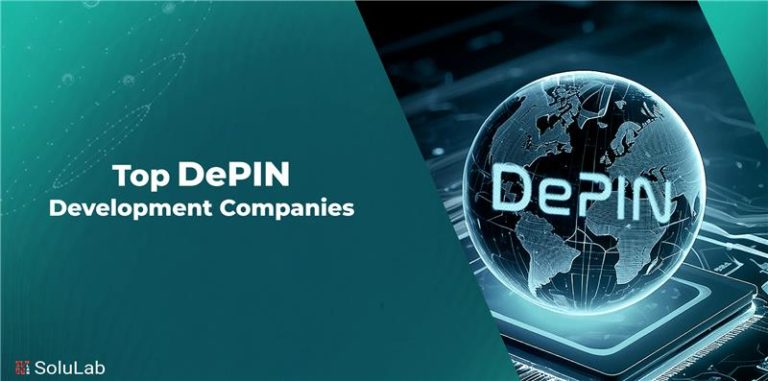Since its debut with Bitcoin, blockchain has become a trusted solution across finance, healthcare, logistics, and more—valued for its transparency, security, and decentralization.
With the market projected to hit nearly $1,000 trillion by 2032, choosing the right platform is key to building a successful blockchain application. Industries like supply chain, healthcare, logistics, and finance now widely adopt blockchain for its capacity to enhance transparency and streamline business processes. Immutability, security, and decentralization stand as the pivotal traits defining blockchain’s popularity.
This blog highlights the Top 10 blockchain platforms of 2025 to help you make the right choice. But first, let’s quickly revisit what makes blockchain so impactful.
What Exactly is a Blockchain Platform?
To delve into this query, let’s first grasp the essence of blockchain technology. Recognized as Distributed Ledger Technology (DLT), blockchain ensures data integrity through invulnerability to alterations and transparency achieved via decentralization and cryptographic hashing.
In blockchain, information is organized into linked blocks, each possessing a set storage capacity. As these blocks fill up, they are closed and connected to previous ones, forming the characteristic chain structure, hence the name “blockchain.”
Now, turning our attention to the main topic — what exactly is a blockchain platform? Blockchain platforms, also known as blockchain frameworks, serve as foundational elements for crafting applications based on blockchain technology.
Consider the scenario of creating an NFT marketplace. To bring this concept to life, one would typically navigate through intricacies in front-end design, back-end development, and other blockchain-related tasks. Undertaking these aspects from scratch could lengthen the development process. This is where a blockchain platform proves invaluable, streamlining the process by providing pre-existing software, infrastructure, and services.
In essence, a blockchain framework enables businesses to leverage existing resources for building blockchain applications. Now, let’s explore a list of blockchain platforms that offer such convenience in the realm of blockchain development. But, before that let’s have a look at the benefits of utilizing a blockchain development platform!
Advantages of Using Blockchain Platforms
Utilizing a blockchain development platform brings forth a range of advantages, as outlined below:
1. Comprehensive Resource Hub
In the intricate process of developing blockchain or decentralized applications, various prerequisites must be met. A blockchain platform serves as a one-stop shop, providing structured and secure access to all essential components, expediting the development of blockchain applications.
2. Enhanced Productivity
Blockchain facilitates peer-to-peer transactions, eliminating the need for intermediaries between businesses and consumers. This streamlined process contributes to heightened levels of productivity and Return on Investment (ROI) for businesses.
3. Fraud Prevention
Once information is stored on the blockchain, its immutability makes it nearly impossible to misuse or alter. This inherent feature of blockchain technology ensures a robust defense against fraudulent activities.
Related: Benefits of Blockchain-as-a-Service
Understanding Different Blockchain Platforms
As listed below, there are four types of blockchain platforms:
1. Public Blockchain
One of the most frequent forms of blockchain networks is the public blockchain. Anyone with a stable internet connection may connect to the network and begin confirming the blocks.
The most well-known example of a public blockchain network is Bitcoin. Anyone may access, read, write, and participate in the network.
2. Private Blockchain
A permissioned blockchain is another name for a private blockchain.
It is, as the name implies, a distributed ledger that no one can access. It is only available to those who have been granted authorization. A user can only do actions that have been properly authorized by the ledger administrator.
Similarly, in order to access the blockchain, the user must show a digital certificate or utilize another kind of digital verification.
The most well-known examples of private blockchain networks are Ripple (XRP) and Hyperledger.
3. Consortium Blockchain
Because more than one entity maintains the blockchain network in consortium blockchain, it is called semi-decentralized.
Simply said, consortium blockchain networks allow businesses to exchange information while also verifying the validity of transactions. Banks, governments, and organizations are the primary users of networks like a blockchain network.
The Energy Web Foundation and IBM Food Trust are two major instances of consortium blockchain.
4. Hybrid Blockchain
A hybrid blockchain is one that combines public and private blockchains. This network may be used by the business to establish restrictions over individuals and the data they have access to. In some circumstances, a company can make specific information public, while others must remain secret and accessible only to authorized people.
Dragonchain is a well-known example of a hybrid blockchain.
Top Blockchain Platforms
Blockchain functions as an immutable ledger that enables decentralized transaction processing. Now, you must be wondering what are the best blockchains to be used. So, the top blockchain platforms in use right now are listed below.
1. Ethereum
Back in 2013, Ethereum came onto the scene and quickly became one of the most talked-about names in blockchain. Unlike Bitcoin, which mainly focuses on payments, Ethereum opened the door to something new: smart contracts—tiny self-executing programs that run on the blockchain.
Ethereum isn’t just popular because it's old—it has a full toolbox for developers. Languages like Solidity and tools like the Ethereum Virtual Machine (EVM) make it easier to create dApps, especially in areas like NFTs, where people are trading unique digital items.
Plus, Ethereum’s not alone. It’s backed by a strong community and the Enterprise Ethereum Alliance, which includes major players like Microsoft and JPMorgan. So even if it's not the fastest horse in the race, it’s definitely one of the most trusted—and that counts for a lot. No wonder it ranks high on the top blockchain platform list and remains central to the top blockchain platforms for crypto development.
2. IBM Blockchain
IBM Blockchain takes a slightly different path from open public networks. It’s a permissioned platform, which means only approved participants can access it—something that works well in corporate settings. Instead of building entirely new systems, IBM made sure its blockchain meshes well with existing business infrastructure, which has helped in industries like supply chain, finance, and retail.
One standout project is IBM Food Trust. It tracks the entire food journey—from the farm to your fork—with major retailers like Walmart already using it. In Thailand, IBM’s tech helps banks with inter-company payments and digital auctions, showing how adaptable this platform really is.
It may not be the flashiest blockchain, but for enterprise use, it’s among the most practical on the top blockchain platform list, especially for those seeking top blockchain platforms for crypto development in private settings.
3. Hyperledger Fabric
Hyperledger Fabric is like the Swiss Army knife of enterprise blockchains. Created by the Linux Foundation, it’s built with flexibility in mind—especially for businesses that need more control over who sees what. It's modular too, which means companies can plug in only what they need and skip the rest.
Instead of everyone seeing every transaction, Hyperledger Fabric lets organizations isolate data in private "channels"—a feature that’s especially handy for industries with strict privacy rules. It also supports different data models like accounts or UTXO, depending on the need.
Its community continues to add features and optimize performance, and if you're a developer building in a corporate environment, Fabric’s structure makes it one of the top blockchain platforms for crypto development. It’s no surprise it holds a firm spot on the top blockchain platform list.
4. R3 Corda
Corda, developed by R3, marches to its own beat. Some argue it’s not technically a blockchain because it doesn’t bundle transactions into blocks. But that’s part of the appeal. It processes transactions one by one in real-time, which gives it a performance edge.
One of its standout features is delivery-versus-payment, which helps settle trades across different systems without hiccups. In insurance, it's used to handle claims and settlements more efficiently.
With a strong foothold in finance and a system that prioritizes real-world performance over blockchain purity, Corda earns its place among the top blockchain platform list—especially for enterprise-grade use cases beyond the scope of most best new blockchains.
5. Tezos
Tezos has been around since 2014 and takes pride in its adaptability. It was one of the first platforms to let users upgrade the protocol without needing to fork—which means no painful splits or migrations for developers and users.
This flexibility comes from its on-chain governance model, which lets the community vote on changes. It’s a big deal, especially when you want to evolve without starting from scratch. Tezos also runs on a PoS system, which is easier on the environment than older blockchains.
From NFTs to enterprise integrations, Tezos keeps up with the pace of innovation. It might not always make the headlines, but its steady stream of upgrades makes it a reliable player in today’s best new blockchains and a top choice on any top blockchain platforms for crypto development list.
6. EOSIO
EOSIO showed up in 2018 with a clear focus: build a blockchain fast enough for real-world apps. It uses a Delegated Proof of Stake (DPoS) system to process thousands of transactions per second, and it doesn’t stop there—it also allows developers to create powerful dApps with minimal delays.
In 2023, EOSIO-Taurus, an enterprise-optimized fork, emerged to handle more data with better resilience. A major update in 2024 introduced the Savanna consensus model, which made the platform faster and more scalable.
For builders who want something responsive, EOSIO is one of the top blockchain platforms for crypto development, especially for high-performance needs. It’s firmly planted on the top blockchain platform list and continues to gain traction among the best new blockchains.
7. Stellar
Stellar was created with financial inclusion in mind, aiming to simplify how money moves across borders. It’s efficient, lightweight, and built for speed—qualities that make it ideal for decentralized finance (DeFi).
It uses the Stellar Consensus Protocol (SCP), which doesn’t require mining and can finalize transactions quickly and securely. That’s why it’s used by MoneyGram, Circle, and Flutterwave for everything from remittances to treasury infrastructure.
While it doesn’t try to compete with every blockchain use case, it dominates the payments space. Stellar has earned its place among the best new blockchains and is featured regularly in discussions about the top blockchain platforms for crypto development.
8. Consensys Quorum
Quorum started out as a JPMorgan project and later evolved under Consensys’s stewardship. It keeps the flexibility of Ethereum but adds features enterprises care about—like privacy controls and regulatory compliance.
With support from Visa and Mastercard, Quorum has been used to develop advanced transaction rollups and test central bank digital currencies (CBDCs). It’s fast, secure, and scalable for real-world business use.
If you're looking for an enterprise-ready Ethereum variant, Quorum deserves its spot on the top blockchain platform list. It bridges the gap between public chains and private needs, and it's consistently mentioned among the top blockchain platforms for crypto development.
9. Ripple
Ripple keeps things simple and focused: fast, cross-border payments for institutions. Unlike other platforms that try to be all things at once, Ripple sticks to what it does best. Its RippleNet protocol and native token XRP are designed to move value between currencies and banks in seconds.
Instead of mining or staking, Ripple uses a consensus mechanism based on trusted nodes to validate transactions, which cuts down both cost and energy use. This efficiency is part of why companies like Santander and American Express have experimented with Ripple tech.
Ripple may not be the trendiest name in crypto anymore, but it’s deeply entrenched in the financial world—and that secures its spot on the top blockchain platform list and among the top blockchain platforms for crypto development.
10. TRON
TRON launched in 2017 with a bold vision to decentralize the internet. It’s especially popular in the world of entertainment, letting users publish, share, and monetize content without middlemen.
It runs on a DPoS consensus model, which helps it deliver high-speed transactions and low fees. That’s why it’s been widely adopted in Asia, especially for gaming, streaming, and DeFi apps.
Though it sometimes flies under the radar, TRON’s performance and ecosystem make it one of the best new blockchains and a strong player in the top blockchain platforms for crypto development. It comfortably earns its place on the top blockchain platform list.
How to Select a Blockchain Platform for Your Business?
The following can be taken into account to determine what are the best blockchains that suit the user:
First comes the objective: What will you be doing with the platform? For certain uses, different platforms work better. For instance, Hyperledger Fabric is a strong option for creating business apps, but Ethereum is a fantastic option for creating decentralized applications.
Secondly the platform’s level of development: A highly developed platform will have a bigger user base and more resources at its disposal. Then weigh in on the platform’s security. When selecting a blockchain platform, security is an important element to take into account. last but not least see if the platform’s price matches your capacity. While some blockchain development platforms are cost-free to use, some do require a large sum of money according to the requirements.
Concluding Remarks
The choice of which consensus algorithm best suits a given use case is becoming more difficult for blockchain experts/designers as more blockchain development services/technologies are made available in permission contexts. There are a number of best blockchain platforms, but companies must know which ones to employ to create highly scalable apps.
SoluLab is a leading blockchain development company offering secure, decentralized, and immutable blockchain solutions to start-ups, businesses, and enterprises. Their wide range of blockchain development services aims to create more efficient and automated versions of organizations while fostering trust and transparency. By thoroughly examining each client’s needs, they tailor solutions to leverage blockchain technology effectively. With a focus on agile development and a commitment to delivering exceptional business results, SoluLab sets itself apart from other companies in the field.
Our team of top-skilled Blockchain developers specializes in creating decentralized applications for various blockchain protocols, including Ethereum, Hyperledger, Solana, and more. Look no further than SoluLab for all your blockchain development needs; contact them today to harness the power of blockchain technology for your organization.
FAQs
1. What are the benefits of Blockchain platform?
Blockchain platforms offer decentralized data management, enhanced security through cryptography, transparency, immutability of records, and efficient transaction processing without intermediaries.
2. Which blockchain platform is known for its smart functionality?
Ethereum is widely known for its advanced smart contract functionality, allowing developers to create decentralized applications (dApps).
3. What is the most secure Blockchain platform?
Ethereum is considered one of the most secure blockchain platforms due to its robust infrastructure, large decentralized network, and strong security protocols.
4. Which blockchain platform introduced smart contracts?
Ethereum introduced smart contracts, enabling programmable and self-executing agreements on the blockchain.
5. What is the main purpose of using Blockchain platforms?
The main purpose of blockchain platforms is to provide a decentralized and secure way to manage, store, and transfer data or assets, eliminating the need for intermediaries and enhancing trust.




